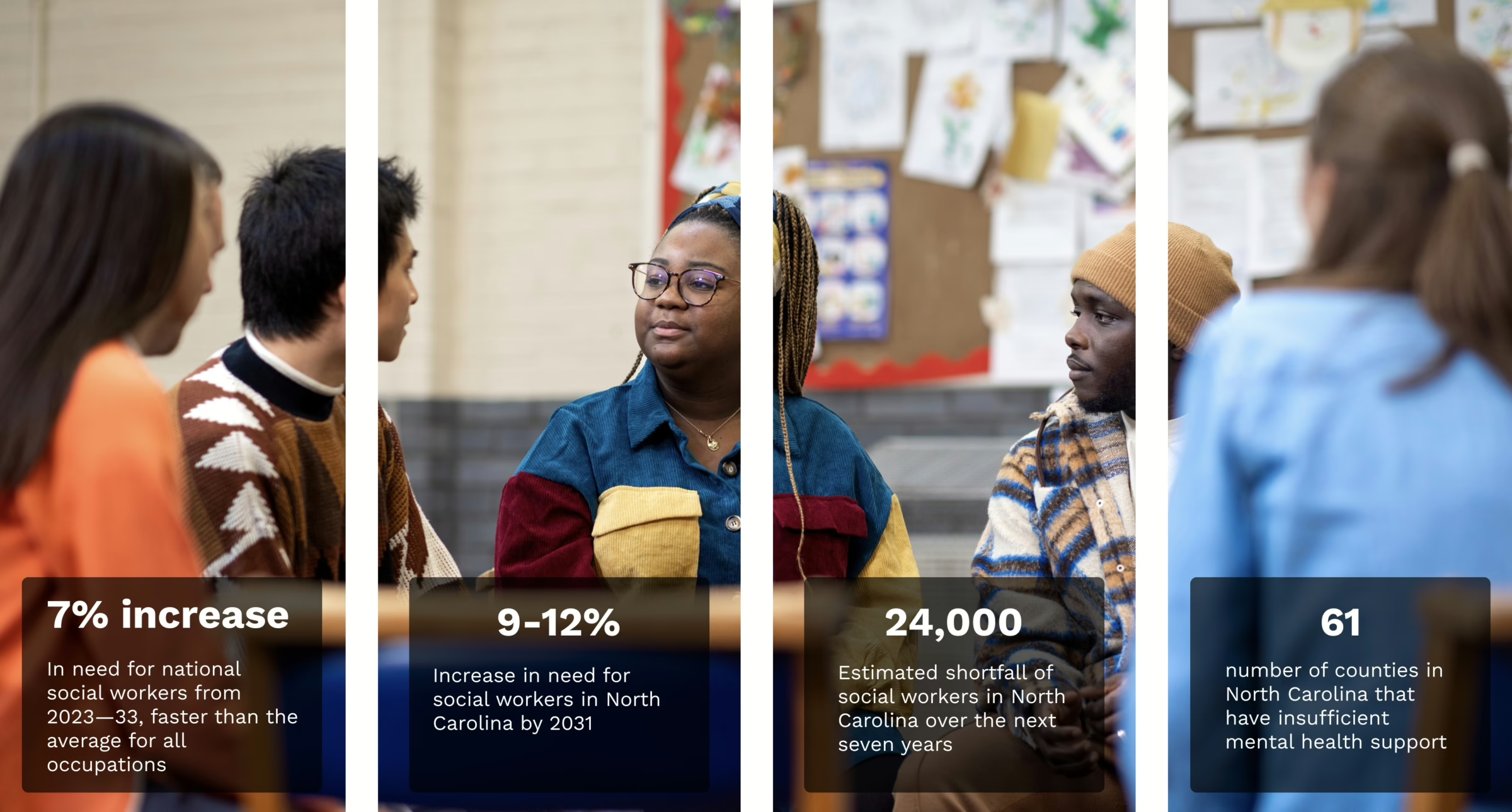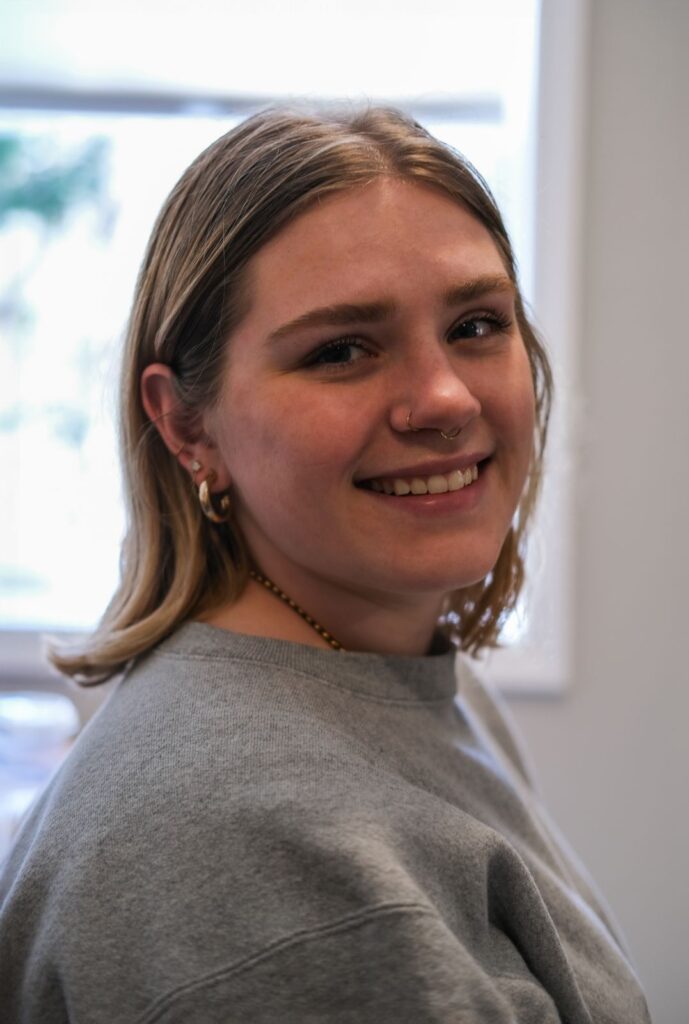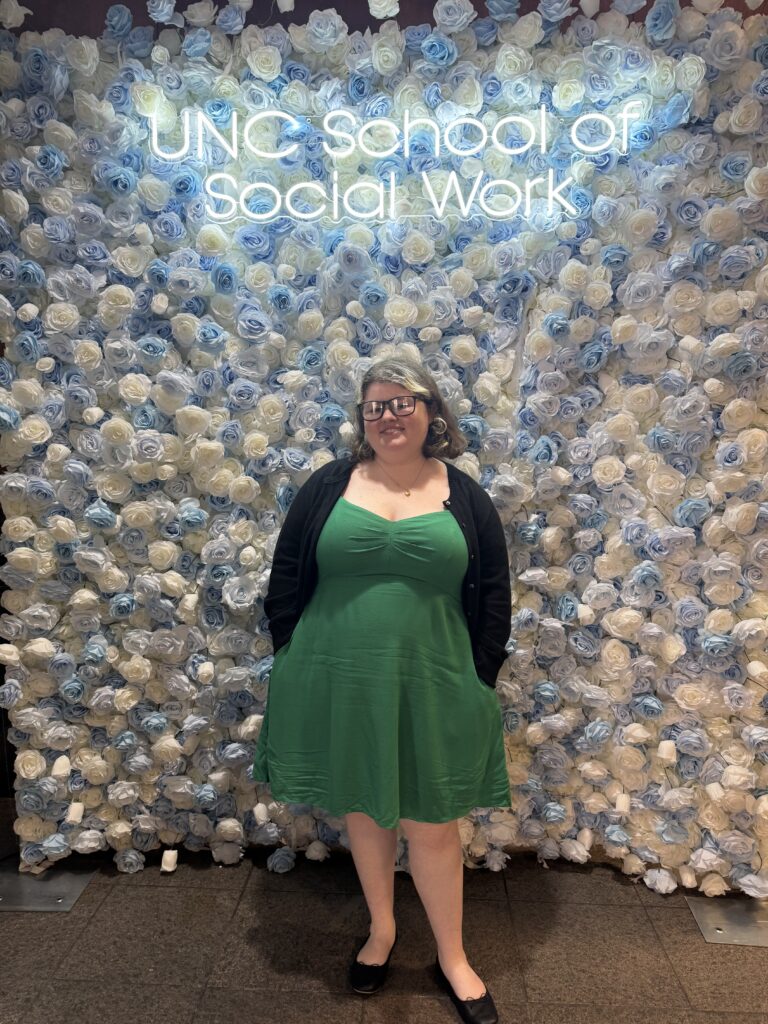Earn your Bachelor of Social Work
degree at the No. 2 public school
of social work in the country
The School of Social Work is developing a brand-new Bachelor of Social Work program, with an earliest projected start date of Fall 2027. Once the program is approved, UNC-Chapel Hill undergraduate and transfer students are eligible to apply to the BSW major. Key components of this new program include:


Learn More
Want to hear more as the program launches and applications open to students? Sign up with your email address and we will reach out with more information in the coming months. Do you have a timely question about the program? Email Amy Levine, Interim Associate Dean of Undergraduate Education, at amylevine@unc.edu.
Find Your Purpose
Jump-start your future while making a real impact in service of people across North Carolina, the nation and the world. Our mission of Advancing equity, transforming systems, and improving lives echoes the field of social work’s dynamic support of vulnerable and marginalized populations to inspire positive change and help communities both in North Carolina and around the world.
~
What can I do with a
Bachelor of Social Work degree?
- Coordinate volunteers and community programs
- Advocate for vulnerable groups
- Provide hands-on support in group homes
- Lobby for legislative change
- Empower youth to reach their potential
- Support people in crisis
- Connect families with vital resources
- Serve in Congress
- Start a nonprofit
Find Your Career
Our communities need social workers! The nation has a shortage of social workers, with too many underserved areas. Graduating with a BSW sets you up to get a job in a field that needs you.

- 7% increase In need for national social workers from 2023—33, faster than the average for all occupations
- 9-12% Increase in need for social workers in North Carolina by 2031
- 24,000 Estimated shortfall of social workers in North Carolina over the next seven years
- 61 number of counties in NC that have insufficient mental health support
Making an Impact
“Earning my BSW put me ahead of the game because social work is truly where my heart is. It gave me the foundation to better comprehend MSW-level content and prepared me for advanced practice. The program strengthened my ability to advocate, communicate, and support diverse populations, skills I use daily in military and community settings. My BSW opened doors to leadership opportunities, professional networks, and graduate study at UNC. For anyone considering it, I would say a BSW is not just a degree. It is your stepping stone to impact and growth in this field.”

Spring Intro Classes and Fall Launch
Planning for this exciting new program is already underway, with new social work intro classes launching in Spring 2026. Here’s a look at the program timeline:
BSW Intro Courses
Course Description
This course focuses on social, economic and structural factors that create and contribute to problems in daily living and explores solutions to foster positive social change. Using social work perspectives, students will engage in reflective assignments, social issue analysis and solution identification related to urgent human needs, strengthening communities and promoting well-being.
IDEAs in Action General Education Focus Capacity: Power and Society
Course Goals:
- Analyze Personal and Collective Identity – Reflect on how personal identity influences social perspectives, interactions and advocacy in achieving social change.
- Explore Ethical Principles and Frameworks for Social Change – Demonstrate knowledge of core values, ethical principles and theoretical frameworks in addressing social challenges from a social work perspective.
- Examine Social Issues and Advocacy Strategies – Research and analyze a pressing social issue, explore its historical and contemporary impact on individuals and communities and identify innovative approaches to address it.
- Engage in Community-Based Learning – Participate in experiential learning through engagement with community organizations, professionals or initiatives addressing a social issue.
- Understand Strategies for Social Impact at Multiple Levels – Evaluate interventions at individual, community and systemic levels, considering approaches for meaningful change.
Course Description
This course examines the social, economic and policy issues shaping the lives of children and families in North Carolina and beyond. Using a person-in-environment framework, students will explore interventions at the micro, mezzo and macro levels to address social complexities and promote family well-being. Through reflective assignments, case studies, group projects and policy discussions, students will gain an in-depth look at the intersection of policy, practice and advocacy while connecting students to contemporary issues affecting families.
IDEAs in Action General Education Focus Capacity: Ways of Knowing
Course Goals:
- Apply the Person-in-Environment Framework – Demonstrate how social, economic and policy factors shape child and family well-being.
- Analyze Social Interventions – Identify and evaluate micro, mezzo and macro-level interventions that address challenges faced by children and families.
- Examine Economic and Policy Impacts – Evaluate how financial disparities, social support programs and structural challenges influence family outcomes.
- Develop Critical Thinking and Reflection Skills – Synthesize course content with personal experiences and current events to deepen understanding of child and family issues.
- Engage in Policy and Advocacy Discussions – Articulate connections with course concepts to real-world policy discussions and career pathways in social work and related fields.
Frequently Asked Questions
The National Association of Social Workers defines social work as “a profession devoted to helping people function the best they can in their environment.”
At its core, social work is a problem-solving profession. Social workers help individuals, families and communities face and overcome challenges that they encounter on a daily basis. The social work profession focuses on improving social welfare, helping individuals from all backgrounds and across the lifespan, and pushing for economic and social justice through legislation and advocacy to solve society’s most intractable problems.
Chances are, you’ve met countless social workers without even realizing it. Social workers wear many caps and occupy roles in multiple sectors including health care, government, education and social service. Though their roles might differ, the individuals are connected by a passion for improving lives. Here are some of the focuses of social work, as illustrated by the National Association of Social Workers: administration and management, advocacy and community organizing, aging, child welfare, developmental disabilities, health care, international social work, justice
and corrections, mental health and clinical social work, mental health and substance use social work, policy and planning, research.
Bachelor of Social Work (BSW) programs provide undergraduate students with a strong foundation in social work theories, research, and practice. Through engaging coursework, students explore key topics such as human behavior, social policy, individual and family assessments and interventions, case management, and community engagement. The curriculum blends classroom instruction with extensive hands-on, community-based practicums, allowing students to apply their skills in real-world settings under the guidance of experienced professionals. To confer a BSW degree, students are required by the Council on Social Work Education (CSWE) to complete a 400-hour practicum focused on developing and demonstrating competence in specific core areas of social work practice.
Transfer students who have completed more than 36 credit hours by the end of their third semester and are in good academic standing are eligible to apply to the BSW major.
One of the best ways to prepare for admission into the Bachelor of Social Work (BSW) program is by gaining experiences that connect you to people, communities, and causes you care about. These opportunities don’t need to be limited to traditional social service agencies—what matters most is that you show initiative, commitment, and reflection on what you’ve learned. Here are some ways to get involved:
On-campus opportunities: Carolina Center for Public Service, UNC Campus Y, Department-Based Opportunities.
Health & Human Services Settings: UNC Health Volunteering, Hospice and Palliative Care Volunteers, Crisis Hotlines or Peer Support Lines.
Community-Based Engagement: Local Nonprofits, Schools & Tutoring Programs, Community Centers.
Leadership & Advocacy: Student Organizations, Civic Engagement, Peer Mentoring or Orientation Programs.
Work Experience: Paid positions in childcare, elder care, summer camps, or residential facilities; Roles as a research assistant in psychology, public health, or related fields; Campus jobs in student affairs, residence life, or academic support centers.
Contact Amy Levine, Interim Associate Dean of Undergraduate Education, at
amylevine@unc.edu.



